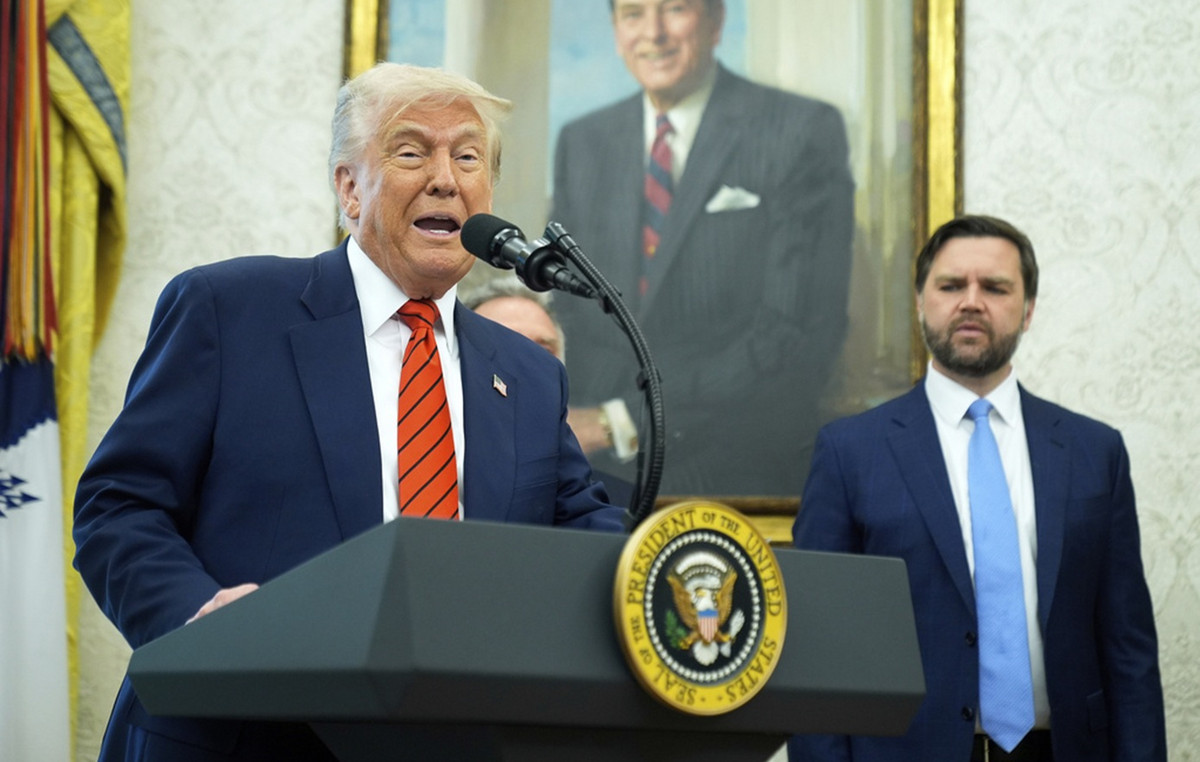Former President of the United States, Donald Trump, faces a series of legal proceedings that could change the course of this year's presidential elections.
The main question raised by experts is whether Trump could continue in the presidential race even if convicted. The American Constitution opens up two paths for interpretation.
As the Trump issue is unprecedented in the United States, see what could happen to the former president:
What does the Constitution say?
“There is nothing in the Constitution that prevents him from governing. Unlike Brazilian legislation, there is nothing similar to Ficha Limpa in the North American scenario”, says Lucas Martins, professor and doctoral candidate at Temple University, in Philadelphia, USA.
The Constitution makes only three demands on presidential candidates:
- Be a natural-born citizen;
- Be at least 35 years old;
- Be a resident of the United States for at least 14 years;
“A person can, even in prison, campaign and become president”, says professor of International Relations Carlos Gustavo Poggio, from Berea College, in Kentucky, USA.
Poggio further adds: “Nothing that happens in the criminal field would interfere with Trump being a candidate.”
What is the 14th Amendment?
However, an amendment to the Constitution, made after the Civil War in the 19th century, could change the course of the elections this year.
The 14th Amendment says “no person shall hold any office, civil or military, within the United States, or under any State, who has been engaged in insurrection or rebellion against the State.”
However, the Constitution does not specify how to apply this prohibition and is open to interpretation. “As this has never been applied to a president, as it is absolutely unprecedented and there is no precedent, there is no clarity on the issue,” says Poggio.

Trump is being investigated by the US Department of Justice for his attempt to reverse the result of the 2020 elections, which gave victory to Joe Biden.
Officials said that during his final months in office, Trump pressured them with false claims of widespread voter fraud. His supporters attacked the Capitol on January 6, 2021 in an attempt to stop Congress from certifying Biden's victory.
The charges involve:
- conspiracy to defraud the United States;
- conspiracy to obstruct an official proceeding of the U.S. government;
- obstruction and attempted obstruction of an official proceeding;
- and civil rights conspiracy [votar e ter o voto validado].
This case could, depending on the interpretation, take the Republican out of the race. However, even if convicted, Trump can still appeal to the US Supreme Court, which will have the final word.
“If he appeals to the Supreme Court and is granted, the decision of the country’s top court will prevail. And, in the current composition, the most conservative judges tend to favor him”, says Lucas Martins.
Process in Colorado
The 14th Amendment led the Colorado Supreme Court to remove Trump from the Republican party primaries that define who will run for president.
The 4-3 decision last month highlighted that Trump is constitutionally ineligible to run in 2024 because the 14th Amendment prohibits insurrectionists from holding office. The decision refers to Trump's involvement in the invasion of the Capitol on January 6, 2021.

The Republican's defense claims that the constitutional change does not apply to presidents currently in office – which would be the case of Trump, who remained in power until January 20, 2021, with the inauguration of Joe Biden.
“Another argument from Trump's defense team is the issue of presidential immunity, which is also not something that is written (in the Constitution), but there is an expectation that the Supreme Court will interpret that the president, while in office, is immune of any type of criminal and civil proceedings for the acts he does as president of the USA”, says Poggio.
The Colorado issue reached the US Supreme Court, after Trump filed a lawsuit to try to reverse the state's decision.
Now, it is in the hands of federal judges to decide Trump's future in politics. The decision of the highest American court will apply to the entire country.
“A conservative Supreme Court tends to favor Donald Trump in his lawsuits against his ineligibility in the states of Maine and Colorado. This is not just a political issue involving liberals and conservatives, but above all a question of protection in setting precedents”, says Lucas Martins.
Professor Poggio highlights that “in addition to a conservative Supreme Court, there are a series of weaknesses in the argument for the 14th Amendment; I think it’s difficult for it to be approved by the court.”
Another issue raised by lawyers is that Trump has not yet been convicted by the Department of Justice, leaving room for interpretation by judges in each state.
According to Professor Poggio, the constitutional remedy for what Donald Trump did in January 2021 would be conviction in the impeachment process, something that did not happen.
Any other type of legal maneuver is weakened. Constitutionally, impeachment would be the way to deal with what Trump did.
Carlos Gustavo Poggio, professor at Berea College
Process in Georgia
The 14th Amendment also affects the case of Georgia. Trump and 18 other defendants are accused of pressuring state election officials to reverse his 2020 defeat to current President Joe Biden. Biden's victory in Georgia was one of the determining factors in the Democrat winning the race.
“In this case, we expect the juries to take into account the dangerous precedents related to the 14th amendment, which may or may not be attributed to the president of the United States depending on the interpretation”, says Lucas Martins.
Trump is still involved in two more court cases
Process regarding confidential documents:
The FBI executed a search and seizure warrant at former President Donald Trump's Mar-a-Lago resort and recovered at least 15 boxes of confidential US presidential records and documents.
The measure was the kickoff for a series of 37 investigations filed by special prosecutor Jack Smith against the republican, who used the mansion as an unofficial residence to receive heads of state and carry out official agendas throughout his term.

For Lucas Martins, the “Mar-a-Lago case, it is unlikely that Trump will be found guilty, since the case is in the hands of a federal judge appointed by him”.
Process in New York:
The first criminal case in which Trump became a defendant was also in New York state court.
He was accused of disguising the alleged payment to former pornographic actress Stormy Daniels as legal fees in his business group's accounts. In exchange, during her campaign for president in 2016, she would hide an extramarital affair they had allegedly had.
Professor Lucas Martins highlights: “Trump has already been found guilty of tax fraud by state courts. It remains to be seen what fines the former president will have to pay and how this will affect the operation of his business in the state”, says the professor.
Source: CNN Brasil
Bruce Belcher is a seasoned author with over 5 years of experience in world news. He writes for online news websites and provides in-depth analysis on the world stock market. Bruce is known for his insightful perspectives and commitment to keeping the public informed.







